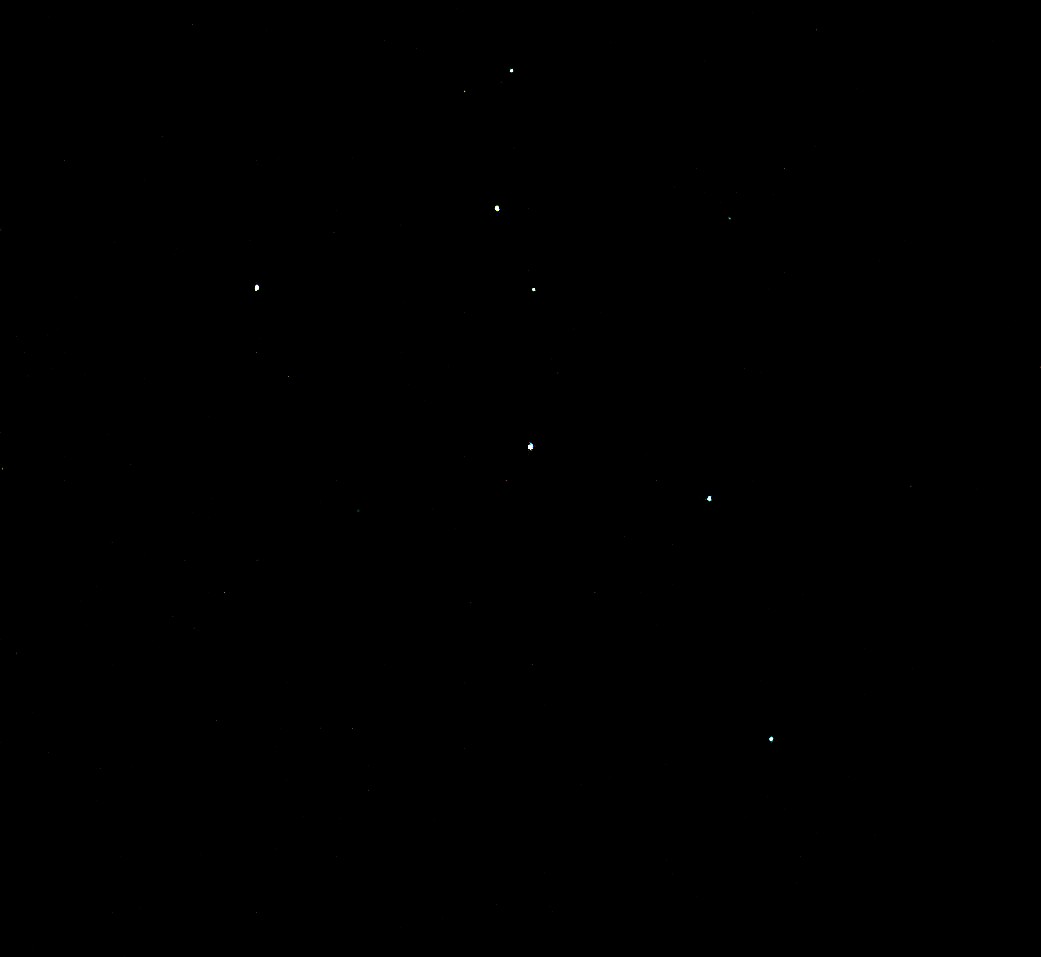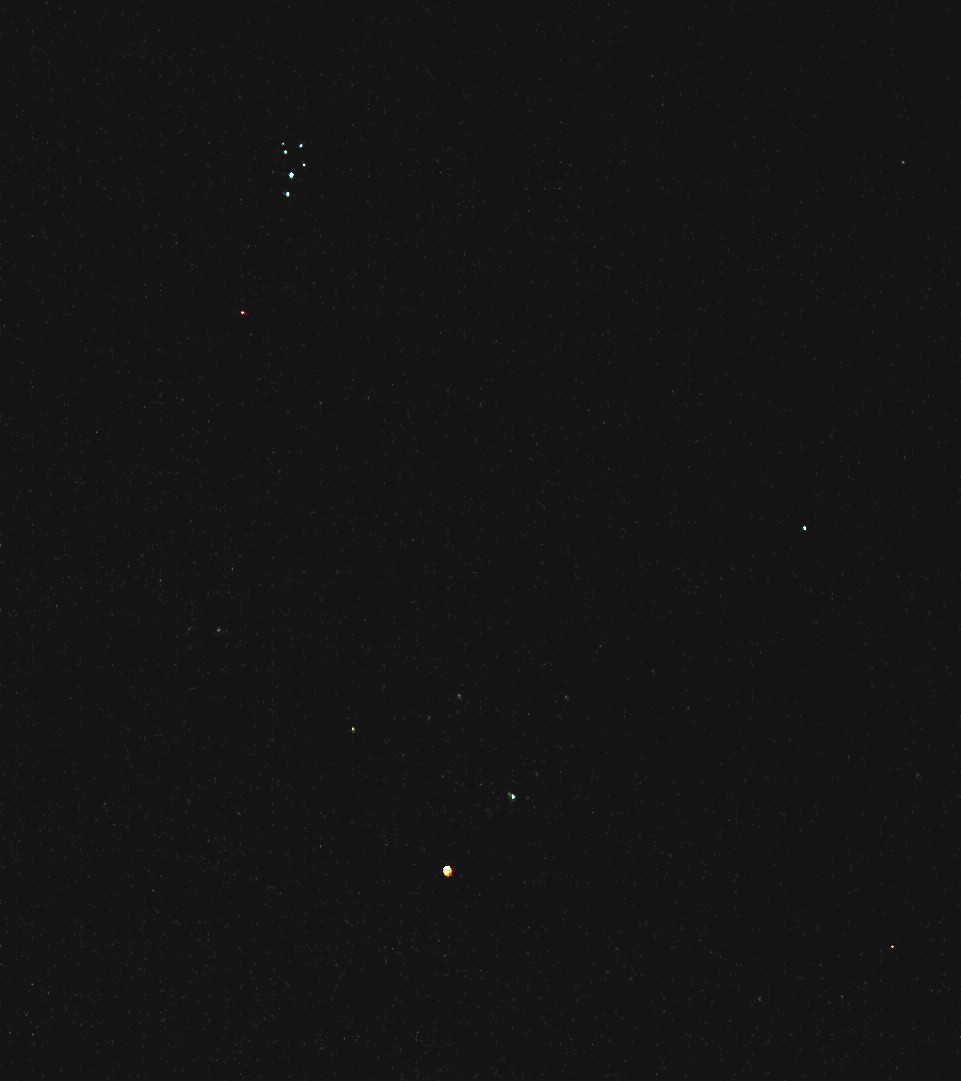Per Aspera Ad Astra Et Cetera

Cassiopeia
Bleary-eyed in the driveway at 3:30 AM....
My camera is not really geared for astrophotography, but when I'm lucky I can get something. I photographed "Cassie" and the grouping in Taurus below using the longest exposure (4 seconds) and the largest aperture (f/2.8) that my camera would give me. That still gave me a black viewfinder, so I aimed the camera using my other eye. After downloading (and getting a black rectangle) I tweaked the shot in MS Photo Editor to bring out the stars.
Clicking on the photos here and then on the magnifying glass will take you to larger views. I was able to see the Milky Way (growing up a city gal I love the skies down here) but couldn't pick it up on pixel.
Cassiopeia (the "W" in the sky) is the wife of King Cepheus and mother of Andromeda. She's depicted as a woman sitting on her throne -- upside-down, as a form of punishment.
"In ancient Egypt these stars formed an evil group known as the Leg, under the control of the god Set, brother and killer of Osiris; in China they were Wang Liang, a famous charioteer; and to the Celts they were Llys Don, home of the king of the fairies," according to the National Audubon Society Field Guide to the Night Sky.
More mythology and history are available at the Legg Middle School Planetarium website. I've also posted a version with the stars labelled here (click the magnifying glass and scroll to the right).

Hyades, Pleiades, and Aldebaran
Both the Hyades and Pleiades are in the Zodiacal constellation Taurus the Bull. Both are star clusters, the Pleiades a group of young, still-forming stars. The red star Aldebaran (bottom center) is the brightest star in Taurus.
Says the Audubon field guide, "Taurus is assuredly one of the oldest constellations recognized, for it was among these stars that the Sun appeared at the beginning of spring between about 4000 and 1800 BC.... The bull, a symbol of strength and fertility, figures prominently in the mythology of nearly all early civilizations, from Sumer to India to northern Europe."
The field guide continues, "According to Greek mythology, the Hyades were the sisters of Hyas, a great hunter whose death they mourned....Zeus placed the nymphs in the sky in gratitude for their service and pity for their grief.... Taurus's better-known group of 'maidens' is the Pleiades, or Seven Sisters, a small but very noticeable cluster of stars on the bull's shoulder."
The Pleiades look like a miniature dipper at the top. The Hyades are inside the sideways "V" that includes Aldebaran and some stars that show up dimly here. Again, I've posted the labelled version -- and the Legg Planetarium has more info on Taurus. I'd tried several times before to get the Pleiades, so I was thrilled when I finally managed to bring them out.
A recent e-mail from the Art Center brought my attention to the 3D sidewalk art of Julian Beever. Clicking on the thumbnails on his site offers an amazing viewing experience.
I have now done 30 consecutive days of writing, to the tune of 37,427 words. In addition, I took a literal first cut and removed 2,762 words of front-end "recrap". I am now in what amounts to Act 3 of Book #4. There's still a lot of tweaking to do, but I'm finally bringing the drama to a head.
Yesterday I weed-whacked the yard. Today the hurricane shutters arrived and should be up in time for Ernesto, should that storm re-strengthen and head our way. We're still in the "cone" (as of 11:37 PM EDT), though not by much.











2 Comments:
Your camera must be a pretty good one. I can't even get a good moon shot with mine. I love to watch the sky but forget to so much at night.
Hold down the shutters... if you have to!
While you write often of nature here, and of the richness, from insects to the night sky, I do hope you never experience anything anywhere close to the full force of a tropical storm! And I am glad your shutters have arrived...
Post a Comment
<< Home